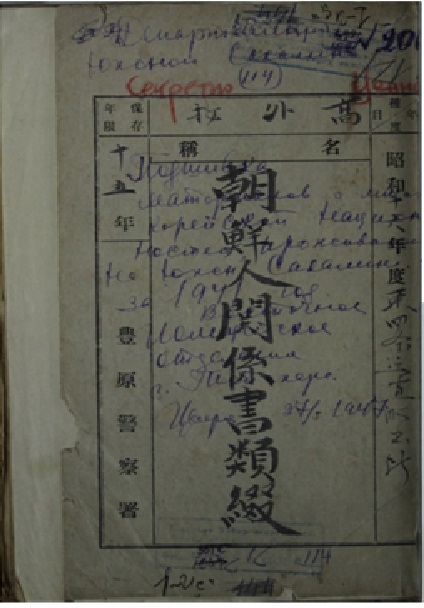
At least 846 Koreans were forced by Japan to work in overseas locations including Sakhalin, the island off the far eastern end of Russia, during the 1910-45 colonial period, a government fact-finding panel said Friday.
The Commission on Verification and Support for the Victims of Forced Mobilization under Japanese Colonialism in Korea under the Prime Minister’s Office said that it had put these Korean victims on its official “list of forcibly mobilized Koreans” for the first time.
Based on its analysis of some 135 historical documents from two state historical archives in Sakhalin, the commission discovered that at least 846 Koreans were forced to work for more than 10 Japanese companies in at least 18 locations including Sakhalin.
Those victims were put on the wanted list of the then-Toyohara Police Station in southern Sakhalin from 1941-44 as they fled the sites of slave labor in the 18 locations including those in Japan, the committee said.
“The victims that we discovered fled and were put on the wanted list afterwards. We secured a considerable amount of these wanted lists, and this would help prove the forced nature of Japan’s state entity (with regard to slave labor),” an official of the panel said, declining to be identified.
“This is the very case in which Korean victims actively opposed and resisted slave labor.”
The committee’s list of these victims is expected to be used as crucial evidence in ongoing or future court procedures involving Korean victims and Japanese firms for which they worked.
Last month, an appeals court in Gwangju, southwestern Korea, ruled in favor of five Korean victims of colonial-era forced labor, ordering Japan’s Mitsubishi Heavy Industries to give a combined amount of 500 million won ($445,990) to the victims in compensation.
The victims that the committee has confirmed were found to have worked in Sakhalin and 17 Japanese prefectures including Hokkaido, Yamanashi, Shizuoka, Hyogo, Aomori, Akita, Iwate, Fukushima, Kyoto and Kanagawa.
The issue of forced labor recently returned to the public spotlight as Japan pushed to put 23 sites of its Meiji-era industrial revolution on the UNESCO World Heritage Sites List without explaining that slave labor took place at seven of the sites.
This weekend, the World Heritage Committee will make its decision over the fate of the sites during its session in Bonn, Germany.
Seoul and Tokyo have engaged in negotiations over the issue, with Seoul demanding that if the sites are designated as World Heritage sites, Tokyo should clearly present the historical facts about the slave labor.
The two sides are nearing an agreement to reveal the dark side of the sites’ history should the sites gain World Heritage status, Seoul officials have said.
By Song Sang-ho (sshluck@heraldcorp.com)
The Commission on Verification and Support for the Victims of Forced Mobilization under Japanese Colonialism in Korea under the Prime Minister’s Office said that it had put these Korean victims on its official “list of forcibly mobilized Koreans” for the first time.
Based on its analysis of some 135 historical documents from two state historical archives in Sakhalin, the commission discovered that at least 846 Koreans were forced to work for more than 10 Japanese companies in at least 18 locations including Sakhalin.
Those victims were put on the wanted list of the then-Toyohara Police Station in southern Sakhalin from 1941-44 as they fled the sites of slave labor in the 18 locations including those in Japan, the committee said.
“The victims that we discovered fled and were put on the wanted list afterwards. We secured a considerable amount of these wanted lists, and this would help prove the forced nature of Japan’s state entity (with regard to slave labor),” an official of the panel said, declining to be identified.
“This is the very case in which Korean victims actively opposed and resisted slave labor.”
The committee’s list of these victims is expected to be used as crucial evidence in ongoing or future court procedures involving Korean victims and Japanese firms for which they worked.
Last month, an appeals court in Gwangju, southwestern Korea, ruled in favor of five Korean victims of colonial-era forced labor, ordering Japan’s Mitsubishi Heavy Industries to give a combined amount of 500 million won ($445,990) to the victims in compensation.
The victims that the committee has confirmed were found to have worked in Sakhalin and 17 Japanese prefectures including Hokkaido, Yamanashi, Shizuoka, Hyogo, Aomori, Akita, Iwate, Fukushima, Kyoto and Kanagawa.
The issue of forced labor recently returned to the public spotlight as Japan pushed to put 23 sites of its Meiji-era industrial revolution on the UNESCO World Heritage Sites List without explaining that slave labor took place at seven of the sites.
This weekend, the World Heritage Committee will make its decision over the fate of the sites during its session in Bonn, Germany.
Seoul and Tokyo have engaged in negotiations over the issue, with Seoul demanding that if the sites are designated as World Heritage sites, Tokyo should clearly present the historical facts about the slave labor.
The two sides are nearing an agreement to reveal the dark side of the sites’ history should the sites gain World Heritage status, Seoul officials have said.
By Song Sang-ho (sshluck@heraldcorp.com)







![[Hello India] Hyundai Motor vows to boost 'clean mobility' in India](http://res.heraldm.com/phpwas/restmb_idxmake.php?idx=644&simg=/content/image/2024/04/25/20240425050672_0.jpg&u=)









